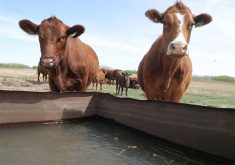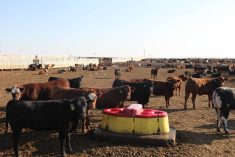The Alberta government last week unveiled an American economic analysis that argued voluntary pooling can be an effective marketing tool in an open market.
Agriculture minister Walter Paszkowski used the report to insist that grain marketing under the Canadian Wheat Board could be made optional rather than compulsory.
He said any redesigned wheat board must give farmers the right to market their grain elsewhere if they choose.
“The opting-out clause should be an amendment that is included in this legislation,” he said during an appearance before a federal parliamentary committee studying proposals to reform the board.
Read Also

Alberta eases water access for riparian restoration
Alberta government removes requirement for temporary diversion licence to water plants up to 100 cubic metres per day for smaller riparian restoration projects
The study touted by Paszkowski was prepared by the American company Senechal, Jorgenson, Hale and Company of Maine.
It was hired by the Alberta government to examine seven voluntary price-pooling organizations and their ability to work side-by-side with an open market trading system. It concluded such structures can survive alongside the open market.
The company studied voluntary pools in Australia, New Zealand and the United States. The commodities marketed included dairy, corn, sugar beets, cotton and rice.
All are farmer-controlled co-operatives. Each required a commitment by farmers to supply raw products and in return, the co-op had to add value to the commodities handled. Some of the agencies sold in the domestic market while others sold into export markets.
The consultants said they selected voluntary pooling organizations with large-scale operations and proven profitability.
Conclusion favors co-ops
After examining a range of voluntary co-ops with a variety of structures, the study concluded they can be successful in competitive conditions.
“These organizations demonstrate that voluntary pooling organizations can enjoy success in marketing a wide variety of products,” said the consultants.
Agriculture minister Ralph Goodale, on an Asian tour, said he had not seen the report but understood it is “largely a discussion of various co-operative organizations, not marketing board situations, and their analysis does not include a number of pretty key questions like the existence or not of government guarantees in support of marketing institutions.
“It may well be that Alberta has a pretty interesting study of various kinds of marketing organizations that may or may not be relevant to the Canadian situation.”

















